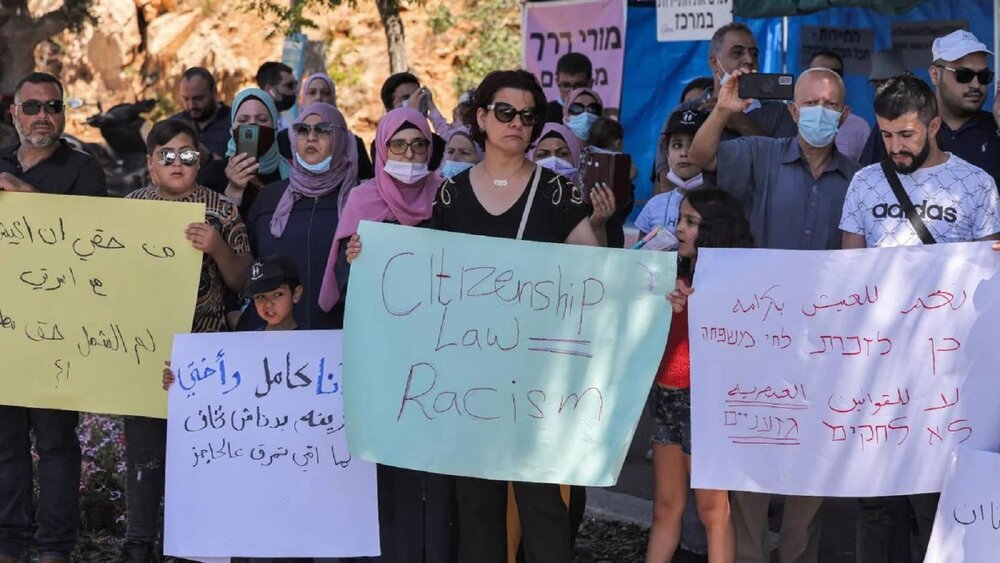Hawzah News Agency – Israel's parliament, the Knesset, has voted to reinstate a controversial law that blocks hundreds of Palestinian families from reuniting and living together.
The so-called Citizenship Law was first introduced in 2003 to prevent Palestinian inhabitants of the occupied West Bank and Gaza Strip from gaining residency or citizenship through marriage to a Palestinian citizen of Israel, or a resident of East Jerusalem.
The bill passed with a comfortable majority of 45-15, with support from both the ruling coalition and opposition aisles of the Knesset, on Thursday evening.
However, half of the Knesset's 120 lawmakers did not take part in the vote for the controversial law, which must be renewed again next year.
The bill replaced a similar temporary order first passed in 2003, which was renewed annually until it expired last July, when the government of Prime Minister Naftali Bennett failed to secure the simple majority needed to extend it.
Following the vote, the Israeli interior minister Ayelet Shaked said that "the combination of forces between the coalition and the opposition led to an important result for the security of the state and its fortification as a Jewish state".
She later tweeted: "A Jewish Democratic country - 1. A state of all its citizens - 0."
The Palestinian-run Adalah advocacy group said in a statement that "the [Israeli] justices will now have to decide whether, when faced with the law's explicit language, they will continue to allow this racist Law to be protected under the eternal pretext of temporality".
'Apartheid regime'
Palestinian citizens of Israel, who make up 20 percent of the country's population and would be gravely affected by the law, have long called for equal rights with their Jewish peers based on citizenship, not religion.
Critics of the law see it as aiming to prevent Palestinians who fled or were expelled during the 1948 war, to Arab countries, or to the West Bank and Gaza Strip, from returning and gaining the right to live in Israel through marriage.
Khaled Zabarqa, a lawyer and Palestinian citizen of Israel, said that "the law enshrines the apartheid regime into a Knesset legislation".
"It is based on demographic reasoning to maintain a Jewish majority," Zabarqa wrote on his social media account on WhatsApp.
"It constitutes an era to target the Arab presence directly, not just our family in the West Bank but also target us [inside Israel]."
Palestinians inside Israel remain close to Palestinians in the West Bank and East Jerusalem, often maintaining family ties through marriage.
In addition, some have links to Palestinians in Jordan, Syria, Lebanon and the Gaza Strip. Figures relating to the extent of the ties are not available.
'Israel's defensive shield'
Bezalel Smotrich, head of the Religious Zionism alliance in the Knesset, said that the law was "a correct and good outline".
Simcha Rothman, another right-wing lawmaker from the party, which calls for a homogenous Jewish state run according to the Torah, said: "The State of Israel is Jewish and so it will remain."
"Today, God willing, Israel's defensive shield will be significantly strengthened," he said on Thursday evening, ahead of the vote.
Gaby Lasky, an Israeli lawmaker from the left-wing Meretz party, said the law was "a black spot on the book of laws in Israel," tweeting that "Meretz as a whole voted against racism."
Mansour Abbas, the Islamist politician and first Palestinian to join an Israeli coalition, said that his party, Raam, had opposed the law.
Several rights groups also said they intended to challenge the legislation in Israel's supreme court.
Reut Shaer, a lawyer with the Association of Civil Rights in Israel, said the law "comes off as more xenophobic or racist".
"It's not only giving extra rights and privileges to Jewish people, but also preventing certain basic rights only from the Arab population," Shaer said.


Your Comment